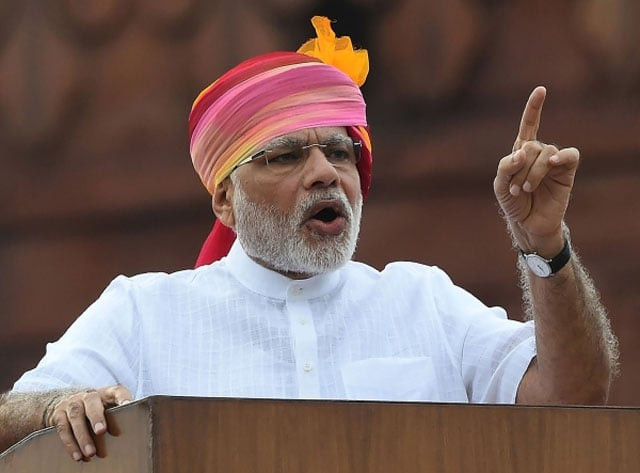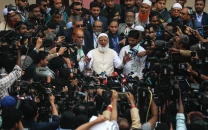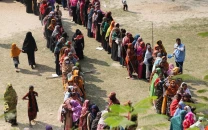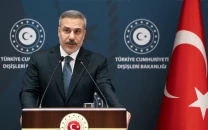Modi spoke India’s mind over CPEC
Not only has India warned China against developing CPEC in Pakistan but also threatened dire consequences

PHOTO: AFP
For Narendra Modi, condemnations of India’s blatantly excessive use of force or any mention of disputed Jammu and Kashmir state are non-issues. To his chagrin, the killing of Burhan Wani on July 8 sparked protests, which led to the deaths of over 50 and left 5,000 Kashmiris wounded. The issue of Indian security forces’ heavy reliance on pellet guns caused an uproar at home and aboard.
Inaugurating fleet tanker: CPEC will defeat enemies’ plot: PM
Pakistan declared Burhan Wani a Kashmiri leader (whom the Indian government termed terrorist) and his death an ‘extra-judicial’ killing.
Islamabad’s support for Kashmiri resistance left Modi fuming. On August 13, the Indian Prime Minister stated, “Pakistan forgets that it bombs its own citizens using fighter planes. The time has come when Pakistan shall have to answer to the world for the atrocities committed by it against people in Balochistan and K-P.” The Bharatiya Janata Party (BJP) leader further added, "What kind of life is this, inspired by terrorism? What kind of government set-up is it that is inspired by terrorism? The world will know about it, and that's sufficient for me.” His anger soared when Pakistani premier Nawaz Sharif dedicated the Independence Day celebrations to the struggle of Kashmiris.
On August 15, the BJP leader and Gujrat’s infamous chief minister appeased his hard-line supporters and proxies elsewhere by stating, “The people of Balochistan, the people of Gilgit, the people of Pakistan-occupied Kashmir have thanked me in such a manner, from places that I have never been and never had a chance to meet, they have sent wishes to the people of India and thanked us. I am grateful to them.”
Modi’s first Balochistan reference, coming days after two terrorists attacks on Quetta hospitals were squarely blamed on India’s RAW intelligence agency, might not have been welcomed by the people of Balochistan but certain renegade militants and activists did appreciate his concern.
Bramdagh Bugti, grandson of Akbar Bugti, not only thanked Modi but also hoped Narendra Modi would raise this issue at international forums. He maintained: “It is too late; we can’t remain with Pakistan any longer as it has deprived us of basic rights.”
Mama Qadeer, another renegade Baloch, told the German Radio, "India supports our cause and the Baloch people appreciate it. Islamabad takes it as Indian interference. They blamed India's RAW for the Quetta attack. They like to blame everything on RAW. The authorities even call me a RAW agent."
None of the messages from India or its alleged proxies in Balochistan were oblique.
Delhi’s sensitivity and persistent failure to integrate Jammu and Kashmir in its federation has reached an epic level. Not only are the harsh laws there to stay in Kashmir but BJP-led coalition in the centre is also going all out to temper with the state’s special status.
UN chief lauds Pakistan’s resolve for peaceful Kashmir settlement
A few exceptions notwithstanding, India’s opposition parties including Congress have backed the BJP approach on Kashmir and Balochistan both. Delhi has refused to pursue a political course to lessen the tensions, signalling more intense military operations coupled with curfew and crackdown. Interestingly, the leaders of occupied Kashmir including Mehbooba Mufti, Omar Abdullah and Mohammed Yousuf Tarigami have refused to subscribe to Delhi’s approach. They don’t see Pakistan instigating the violence, which has made the BJP quite upset.
Some veteran politicians and former diplomats, in their personal capacity, pointed to Modi’s flawed explicit support for Balochisatan resistance and linked it with Kashmir. They believe that the Indian leader has strengthened the Pakistani narrative of a foreign hand in Balochistan on the one hand, and weakened Delhi’s long-held stance on Kashmir. The external affairs ministry has not yet rearticulated Modi’s outburst in sync with its long-held positions. Sushma Swraj, the Indian foreign minister, matches Modi’s profile as a hardliner.
Though the State Department has not condemned India’s excessive use of forces in Kashmir, it has clearly distanced itself from the Indian premier’s assertions. Washington insists that Pakistan and India must resolve the Kashmir dispute bilaterally, a position that Islamabad sees as biased and hypocritical.
Prime Minister Nawaz Sharif has been a dove when it comes to relations with India. His cosiness with Modi has been branded as ‘bromance’. The unexpectedly harsh tone of Delhi leaves him with little choice but to step back. Despite its limited leverage over Islamabad, Washington is trying to press her for a softer stance towards Delhi. The State Department has continued its mantra of do-more against terrorists, which India interprets to its convenience. The just-concluded visit of Norway’s foreign minister may offer a silver lining, only if India exercises restraint in Kashmir.
The current India-Pakistan tension can lead to both limited conflict along the Line of Control and the Working Boundary, as well as a more intense proxy war in Balochistan and elsewhere in the country. Islamabad may retaliate in the same way. The Modi government has signalled zero tolerance for China-Pakistan Economic Corridor. The strategic community there is almost sure that Pakistan will reap multi-faceted benefits in the longer term. While India is actively engaging its navy in South China Sea, it can’t afford a Chinese naval base in Gwadar, on the mouth of the Strait of Hormuz. The Indian strategic community is largely of the view that Delhi has edge over Pakistan in diplomatic, air, land, naval and missile capabilities. Delhi advised against repeating the same mistake it did in dealing Pakistan’s nuclear program. Modi’s Balochistan references are anything, but no slips of tongue.
Naveed Ahmad is a Pakistani investigative journalist and academic with extensive reporting experience in the Middle East and North Africa. He is based in Doha and Istanbul. He tweets @naveed360



















COMMENTS
Comments are moderated and generally will be posted if they are on-topic and not abusive.
For more information, please see our Comments FAQ